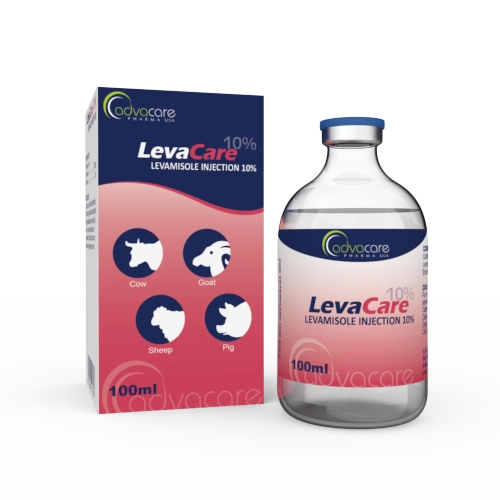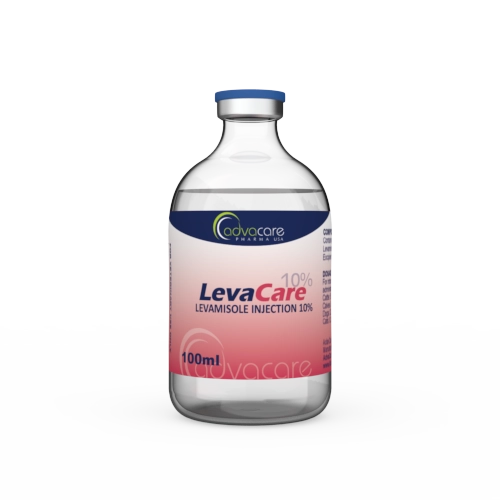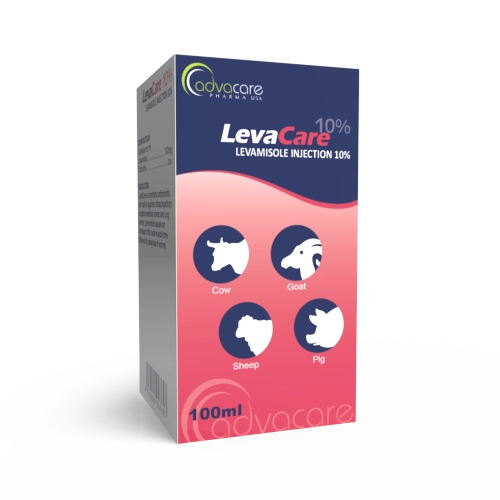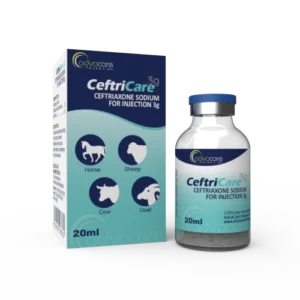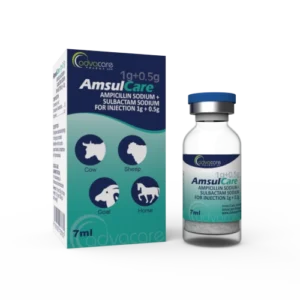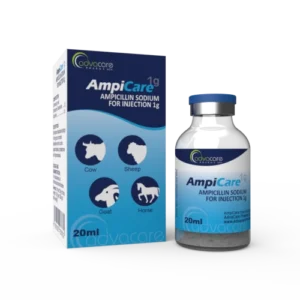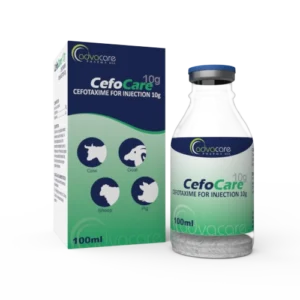What is Levamisole?
- Antiparasitic
- Cat,
- Dog,
- Cow,
- Goat,
- Pig,
- Poultry,
- Sheep
Active Ingredients: Levamisole
Levamisole Injection is an antiparasitic drug and immune stimulant that is used to treat many kinds of nematodes in dogs, cats, poultry and livestock animals like cows, sheep, pigs and goats. In swine, it is used to treat infections caused by Stephanus and Metastrongylus.
Levamisole hydrochloride is an imidazothiazole that belongs to the class of medicines called anthelmintics. It works as a nicotinic acetylcholine receptor agonist. This action causes the continued stimulation of the parasitic worm muscles, leading to paralysis.
Levamisole is commonly used to treat infections caused by lungworms, stomach worms, and intestinal worms, including species such as ascarids, hookworms, strongyles, and trichostrongylus. It is particularly effective against mature and developing immature forms of these nematodes.
It is important to note that Levamisole Injection is for veterinary purposes only.
Basil Hygiecare is a trusted exporter of Levamisole Injection. This medication is produced in our GMP-certified manufacturing facilities in China, India, and the USA.
Why are we a trusted Levamisole manufacturer?
Levamisole Injection is manufactured and globally distributed by Basil Hygiecare, a leading manufacturer of veterinary injections in the pharmaceutical industry. We have been committed to distributing high-quality, GMP-certified veterinary medications for the global market over the past 20 years. As a top Levamisole manufacturer, we ensure that all of our 100+ veterinary injections surpass our distributors’ requirements by conducting routine internal and third-party facility audits.
Precautions
Do NOT use Levamisole Injection for an animal that:
- has a known allergy or hypersensitivity to any of the ingredients.
- is pregnant or lactating.
- is a cat with FIV or FIP.
Treatment with this drug should be administered with caution if an animal:
- is debilitated.
- has renal or hepatic impairment.
- is stressed due to vaccination, dehorning, or castration (in cattle).
Avoid administering IM injections to birds due to their limited muscle mass, which increases the risk of injury and improper drug absorption. The unique anatomy of birds, including air sacs and a high density of blood vessels in the muscles, can lead to complications such as tissue damage, bleeding, and infection.
What are the most common animals Levamisole Injection is used for?
Levamisole is a broad-spectrum anthelmintic used in the treatment of parasitic infestations in various animals, such as:
- Cattle: Levamisole is used to target lungworms and gastrointestinal worms. It acts as an immune stimulant and a paralytic to these parasites, which are then expelled from the animal’s system.
- Sheep: Similar to cattle, sheep are given Levamisole to rid them of lungworms and gastrointestinal worms. It is especially beneficial in managing outbreaks of nematode infections in sheep herds.
- Goats: The drug is utilized in goats to address parasitic challenges like stomach worms, which are a common cause of weight loss and anemia.
- Pigs: In pigs, Levamisole is used to control roundworms that can cause respiratory and digestive issues. Its administration is a critical part of swine health management to ensure the growth and market weight are on track.
- Poultry: Levamisole is employed in poultry to combat roundworms and hairworms, which can lead to poor feed conversion and decreased egg production.
Uses
What is Levamisole used for?
It’s used to treat parasitic infections caused by gastrointestinal, pulmonary, and other roundworms.
What animals can be treated with Levamisole Injection?
It’s recommended for dogs, cats, poultry and livestock like cows, sheep, goats, and pigs. Do not use this drug for horses. Horses have a unique physiology and metabolism, and the drug can potentially cause severe side effects, including colic, central nervous system signs, and other adverse reactions.
How is a Levamisole Injection used?
This medication has been manufactured as a liquid, which is packaged in a vial. It is intended to be administered by subcutaneous or intramuscular injection. Levamisole Injection is intended for veterinary use only.
Is Levamisole available over-the-counter, or is a prescription required?
It is typically available by prescription only and should be administered under the guidance of a licensed veterinarian.
Is Levamisole effective against all types of parasitic worms?
The drug is effective against a range of nematodes (roundworms), but not all types of parasites, such as tapeworms or flukes. Consult a veterinarian for the best plan of action.
Are there any specific breeds or types of animals that are more sensitive to Levamisole?
Some breeds or types of animals may be more sensitive to Levamisole. For example, dog breeds with a genetic predisposition to multidrug sensitivity (like Collies and related species) may be at higher risk of adverse effects.
How does Levamisole work?
Levamisole acts as a nicotinic acetylcholine receptor agonist, which causes spastic paralysis in susceptible parasites. By stimulating these receptors, it results in a prolonged activation of the parasite’s muscle contraction, ultimately causing its death and expulsion from the host animal.
What is the withdrawal period for Levamisole?
The withdrawal time is 3 days for eggs and 7-14 days for meat.
Can Levamisole be used to prevent parasitic infections, or is it only for treatment?
Levamisole is primarily used for the treatment of parasitic infections in animals. While it can be effective against certain parasites, it is not typically used as a preventive measure. Preventive strategies for parasite control may involve other medications, management practices, or vaccines. Consult with a veterinarian to develop an appropriate parasite control plan.
Can Levamisole be used in conjunction with vaccines?
This drug can be used in animals that have been vaccinated; but the timing must be taken into account. Vaccinations may be less effective if the animal is currently fighting a parasitic infection.
Can Levamisole affect fertility or reproduction in treated animals?
There are limited studies on the effect of the drug on fertility and reproduction. But as with many drugs, it should be used with caution in breeding animals.
Is resistance to Levamisole a concern in parasite management?
As with many anthelmintics, resistance development may happen, particularly with frequent and repeated use. Use this medication as part of an integrated parasite management program and to follow veterinary guidance on rotation with other anthelmintics to help reduce the risk of developing resistance.
How is resistance to Levamisole detected and managed in parasitic populations?
Resistance to the drug can be detected through regular monitoring and testing, such as fecal egg count reduction tests.
What should be considered before switching to Levamisole from another anthelmintic?
Before switching anthelmintics, consider the spectrum of activity against specific parasites, the presence of any resistance, and the health status of the animals. A fecal egg count reduction test may be conducted to assess the efficacy of the current deworming program and whether a switch to a different anthelmintic like Levamisole is necessary.
Can Levamisole be used in organic farming?
This depends on the regulations of the specific certifying body. Some organic certifications may allow the use of certain synthetic medications, like Levamisole, under restricted conditions and only when necessary for the welfare of the animal.
How should Levamisole Injection be stored?
This medication should be stored in a dark, dry location under 30°C. The vial should be sealed tightly.
Dosage
How much Levamisole Injection should be given to cows?
The usual dose is 3.3-11mg/kg of body weight.
How much Levamisole Injection should be given to sheep or goats?
The usual dose is 7.5-8mg/kg of body weight, given 3 times per day or 3 times per week. The duration is dependent on the condition being treated.
How much Levamisole Injection should be given to pigs?
The usual dose is 8mg/kg of body weight.
What should be done if a dose is missed?
Depending on the situation and the animal’s health, the veterinarian may recommend resuming treatment with the missed dose or adjusting the treatment plan. Do not double the dose to make up for a missed one without professional advice.
What should be done in case of accidental overdose?
In case of an overdose in animals, seek immediate veterinary attention. Overdosing can lead to severe adverse reactions, including gastrointestinal distress, neurological symptoms, and potentially toxic reactions.
Is there a risk of toxicity with Levamisole?
Yes, particularly if the drug is not used according to the prescribed dosage or if the animals receive an overdose. Signs of toxicity can include salivation, ataxia, and muscle tremors. Management involves symptomatic support, including fluids and treatments to control seizures and muscle tremors, under veterinary supervision.
Refer to a veterinary doctor or pharmacist for guidelines on dosage.
Side Effects
As with all pharmaceuticals, some unwanted effects can occur from the use of Levamisole Injection.
Some common side effects may include but are not limited to:
- hypersalivation (in cattle, goats, or cats)
- lip-licking, head shaking, or trembling (in cattle)
- swelling near site of injection (in cattle)
- excitability (in sheep or cattle)
- depression (in goats)
- pain or stinging at site of injection (in goats)
- gastrointestinal effects (in dogs)
Serious side effects, which may be caused by overdose, include:
- allergic reaction
- agranulocytosis (drastic drop in white blood cell count)
- seizures
- vomiting and diarrhea
If serious side effects manifest, seek help immediately. The veterinarian may advise discontinuing the medication and providing supportive care, which could include administering fluids to prevent dehydration, medication to control seizures, or other treatments to address specific symptoms.
For a comprehensive list of all possible side effects of this medication, consult a veterinarian.
